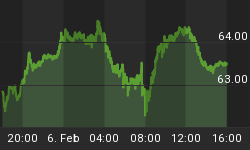Last week's analysis expected upwards movement in a zigzag structure which is what has happened. The upwards zigzag is incomplete.
Cycle wave b is incomplete, and is unfolding as a double zigzag. Primary wave X within it was a contracting triangle.
Extend the triangle trend lines outwards. The point in time at which they cross over may see a trend change, and this may be where primary wave Y ends.
There is not normally a Fibonacci ratio between subwaves W and Y within doubles. A more reliable way to calculate a target for this to end is using the ratio between intermediate waves (A) and (C) within the second zigzag of the double.
At 122.55 intermediate wave (C) would reach 2.618 the length of intermediate wave (A). At 120.84 minor wave 5 would reach 2.618 the length of minor wave 1.
Cycle wave b may not move beyond the start of cycle wave a. This wave count is invalidated with movement above 146.73.
Within the ending diagonal for minor wave 5, minute wave iv may not move below 103.51.
Minor wave 5 is most likely unfolding as an ending expanding diagonal which is incomplete.
Within the diagonal all the subwaves must subdivide into zigzags, including the third wave. The fourth wave of a diagonal should overlap back into first wave price territory, but may not move beyond the end of the second wave.
Minute wave iii is longer than minute wave i, and minute wave iv is longer than minute wave ii. The diagonal is expanding. This would expect minute wave v to be longer than equality with minute wave iii which would be achieved at 114.27. We should expect upwards movement to reach this point at least.
I have seen diagonals sometimes have a third wave which is still the longest, so this minimum is a guideline with a good probability but if it is not reached, as long as the subdivisions are correct, the diagonal may still be valid.
Within the final upwards zigzag for minute wave v the structure is incomplete. Within it minuette wave (b) may not move beyond the start of minuette wave (a). This wave count is invalidated with movement below 105.51.
If price does move below 105.51 then it may be possible (but at this stage unlikely) that minute wave iv is continuing. The invalidation point moves down to 103.51.

















